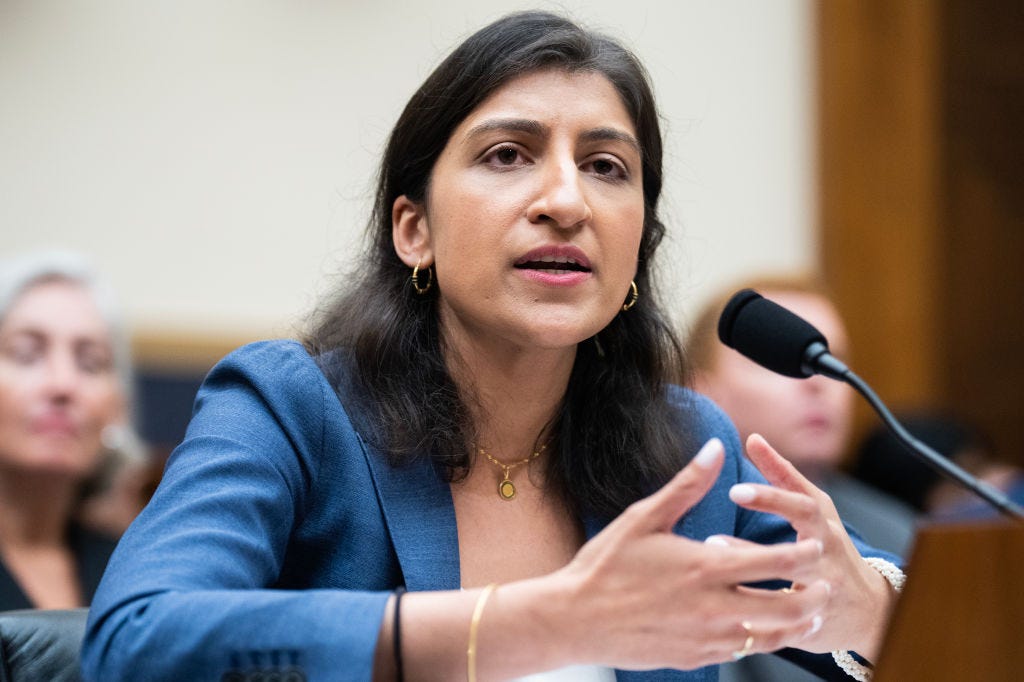Wanna be free? Break up Google
The tech giant's fate hangs in the balance. Here's America's top antitrust enforcer on what monopolies have got to do with your life
In a federal court in Washington, a judge will soon decide Google’s fate. Will it be broken up? And, more importantly, what impact would such a move have on your life?
Antitrust and competition policy is an area that can feel remote to people. Taxes? We get that. Gas prices? We get that. But antitrust?
Hear us out, though. Antitrust policy is very much about your life. And the feeling that it isn’t allows big companies to rule over you.
So we’re returning to this conversation with America’s top competition enforcer, Federal Trade Commission Chair Lina Khan. No one has done more of late to revive antitrust enforcement. But, even more important, no one has worked harder to explain what antitrust policy is to the public, and how monopolies — and the crushing of monopolies — have an effect on your life.
If you like the work we do and you haven’t yet come aboard, will you support this independent media outlet and subscribe?
Balzac wrote, "Behind every fortune lies a great crime." Setting aside the word "every," which is maybe an exaggeration, what do you think are the defining crimes behind the biggest fortunes of today?
I got my start as a reporter and researcher, and my job was to study how different markets had evolved. I spent time talking to chicken farmers, to book authors, to people across a whole set of markets. And it became clear that, over the last 40 years in the United States, we've seen huge waves of consolidation.
You have millions of consumers, thousands of producers, controlled by a handful of companies. These gatekeepers, these dominant middlemen and intermediaries, they play an important function, but the power they've consolidated allows them to pick winners and losers and to enrich themselves as they extract more and more, both from the producers that are actually making stuff and the consumers that are buying it. They’re creating markets that, to a lot of people, just don't seem fair.
You've seen more and more power consolidated and concentrated, and that power being exercised in ways that make other people poorer and more subject to arbitrary whims, and that make them feel more coerced and less free.
So many people say we're in a crisis of democracy, and it's of course a big crisis of democracy, but it takes place in lots of little places also. I think a lot of people may not understand how this specific work you do fits into a bigger question of democracy versus authoritarianism, power for people versus power for the few.
How people experience freedom in their day-to-day lives often involves their economic relationships and what their engagement is like in our commercial sphere. Some of the chicken farmers that I talked to, for example, were so scared of the processors that they were dependent on that they didn't even want to go speak to the government. The fear of retaliation was undermining their free speech rights — core liberties.
Similarly, we see how the expansion of noncompete clauses locks workers into existing jobs, makes it very difficult for them to freely switch employers. Core liberties, again.
One of the original insights of the anti-monopoly tradition in leading up to the passage of the antitrust laws, was that in the same way that we have checks and balances in our political sphere to guard against concentration of political power, that we similarly needed the antitrust laws to safeguard against concentrations of economic power. It was recognized that you really need safeguards on both sides to create real liberty and real democracy.
I wonder how broadly you think about your mandate to regulate tech companies when it comes not just to what we might think of as traditionally deceptive practices, but really corroding democratic participation, the belief in reality, and things like that which might seem a little more ethereal to people.




